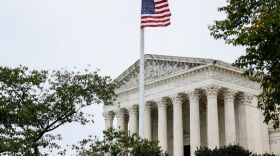
Nina Totenberg
Nina Totenberg is NPR's award-winning legal affairs correspondent. Her reports air regularly on NPR's critically acclaimed newsmagazines All Things Considered, Morning Edition, and Weekend Edition.
Totenberg's coverage of the Supreme Court and legal affairs has won her widespread recognition. She is often featured in documentaries — most recently RBG — that deal with issues before the court. As Newsweek put it, "The mainstays [of NPR] are Morning Edition and All Things Considered. But the creme de la creme is Nina Totenberg."
In 1991, her ground-breaking report about University of Oklahoma Law Professor Anita Hill's allegations of sexual harassment by Judge Clarence Thomas led the Senate Judiciary Committee to re-open Thomas's Supreme Court confirmation hearings to consider Hill's charges. NPR received the prestigious George Foster Peabody Award for its gavel-to-gavel coverage — anchored by Totenberg — of both the original hearings and the inquiry into Anita Hill's allegations, and for Totenberg's reports and exclusive interview with Hill.
That same coverage earned Totenberg additional awards, including the Long Island University George Polk Award for excellence in journalism; the Sigma Delta Chi Award from the Society of Professional Journalists for investigative reporting; the Carr Van Anda Award from the Scripps School of Journalism; and the prestigious Joan S. Barone Award for excellence in Washington-based national affairs/public policy reporting, which also acknowledged her coverage of Justice Thurgood Marshall's retirement.
Totenberg was named Broadcaster of the Year and honored with the 1998 Sol Taishoff Award for Excellence in Broadcasting from the National Press Foundation. She is the first radio journalist to receive the award. She is also the recipient of the American Judicature Society's first-ever award honoring a career body of work in the field of journalism and the law. In 1988, Totenberg won the Alfred I. duPont-Columbia University Silver Baton for her coverage of Supreme Court nominations. The jurors of the award stated, "Ms. Totenberg broke the story of Judge (Douglas) Ginsburg's use of marijuana, raising issues of changing social values and credibility with careful perspective under deadline pressure."
Totenberg has been honored seven times by the American Bar Association for continued excellence in legal reporting and has received more than two dozen honorary degrees. On a lighter note, Esquire magazine twice named her one of the "Women We Love."
A frequent contributor on TV shows, she has also written for major newspapers and periodicals — among them, The New York Times Magazine, The Harvard Law Review, The Christian Science Monitor, and New York Magazine, and others.
-
The U.S. Supreme Court ruled against President Trump on Tuesday, refusing to reinstate, for now, Trump's ability to send Texas National Guard troops into the state of Illinois over the objections of the governor.
-
The ruling is the first time that the court has imposed requirements on adult consumers in order to protect minors from having access to sexually explicit material.
-
The decision issues some limits on the power of federal judges to universally block President Trump's executive order on birthright citizenship, asking lower courts to reconsider their rulings.
-
The decision likely ensures that the case against Trump won't be tried before the election, and then only if he is not reelected.
-
A U.S. Supreme Court opinion briefly posted on its website suggests the court will allow abortions in medical emergencies in Idaho, according to Bloomberg News, which obtained a copy of the opinions.
-
Michael Cargill was forced to surrender two bump stocks after the ban went into effect. On Friday, the Supreme Court ruled the Bureau of Alcohol, Tobacco, Firearms and Explosives exceeded its authority when it banned the devices.
-
Sandra Day O'Connor was called "the most powerful woman in America" during her quarter of a century as a Supreme Court justice.
-
The decision reverses decades of precedent upheld over the years by narrow court majorities that included Republican-appointed justices.
-
The Supreme Court has left the case in the hands of the 5th U.S. Circuit Court of Appeals, which has scheduled oral arguments in the case for May 17.
-
The law is once again on the chopping block — this time on the question of how state legislatures may draw congressional district lines when the state's voters are racially polarized.










